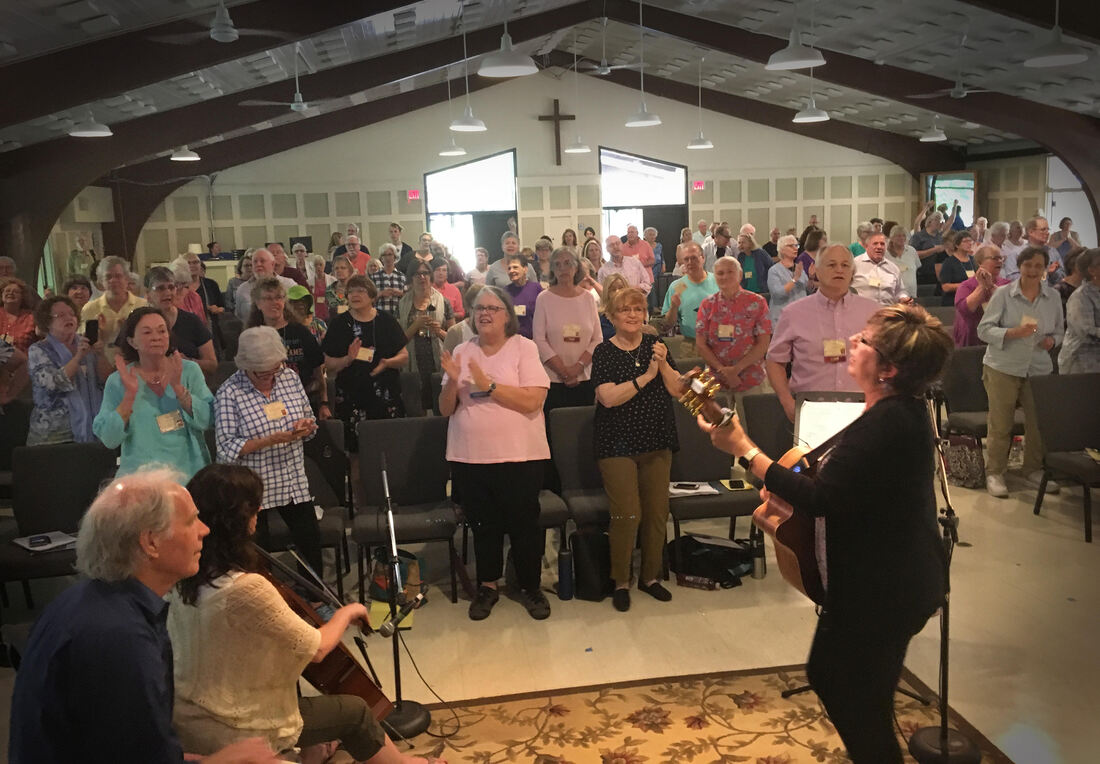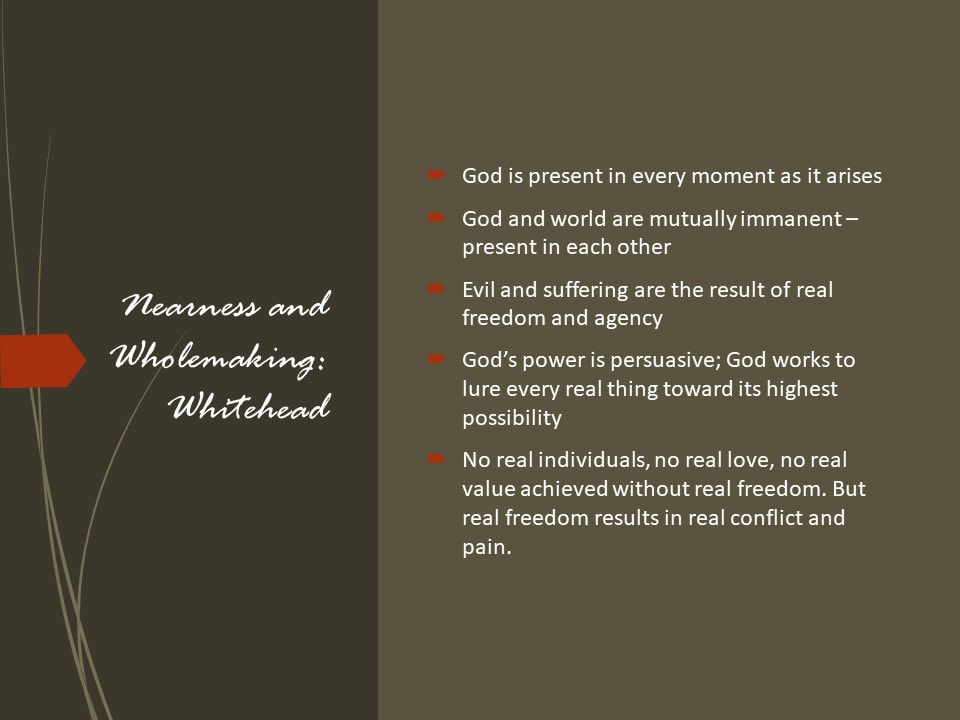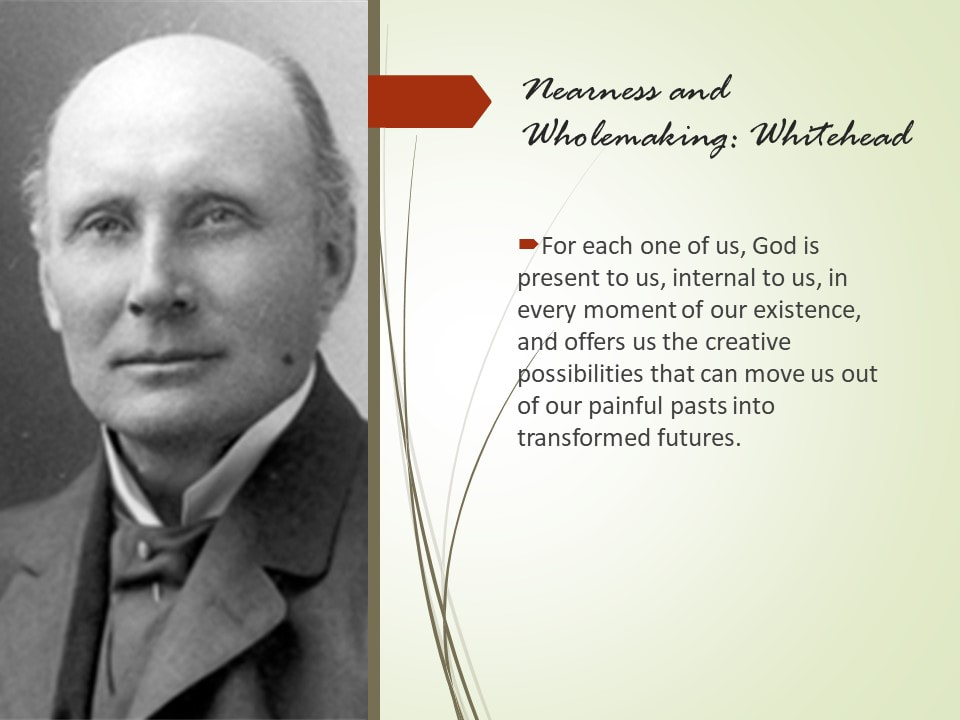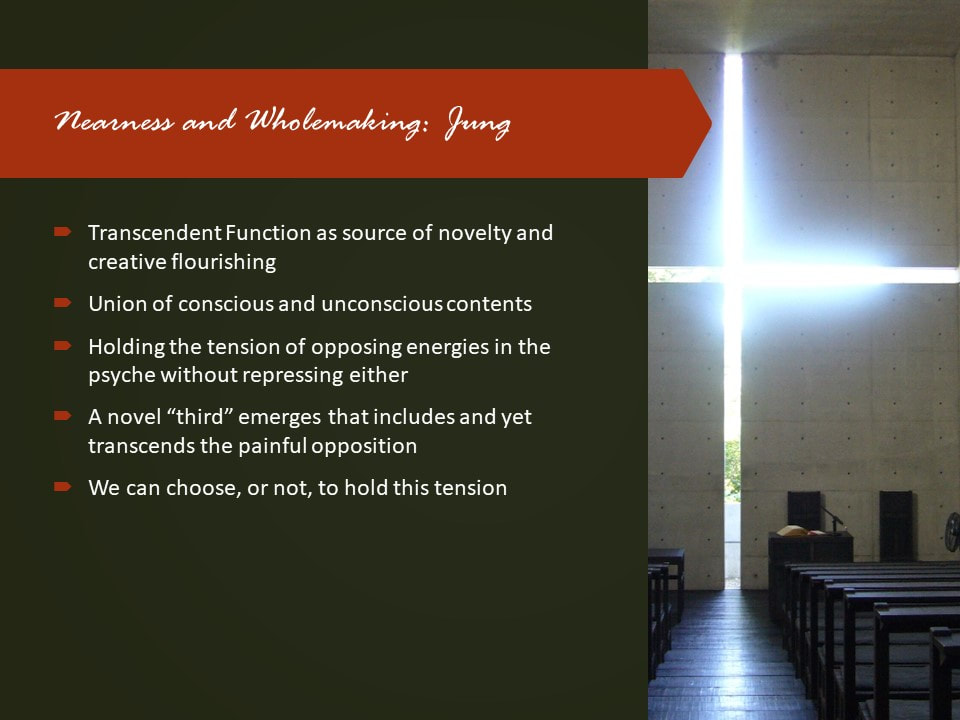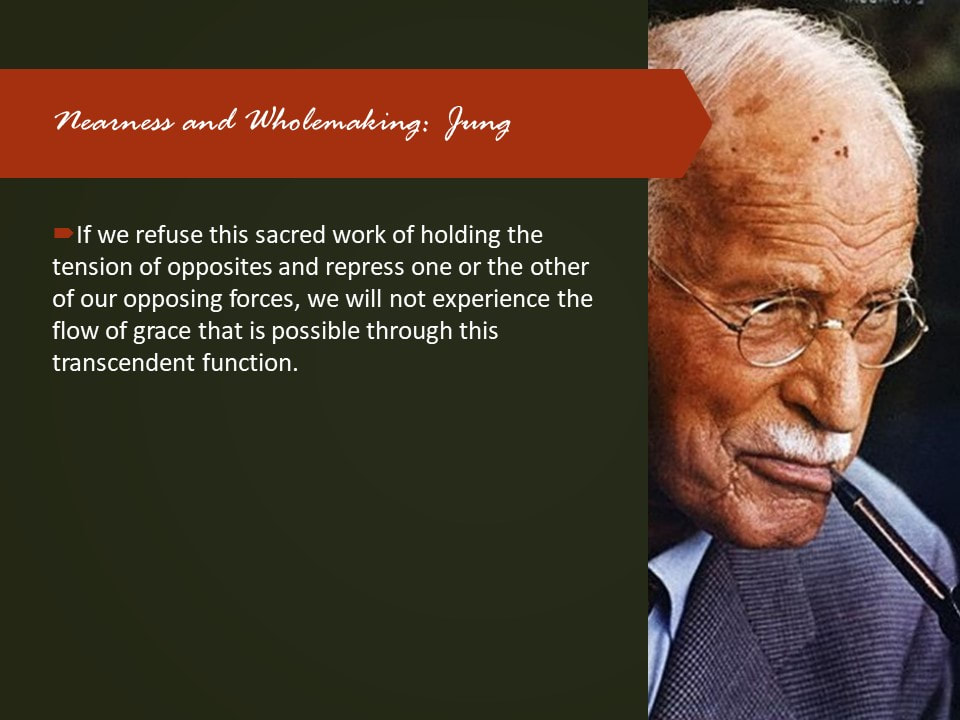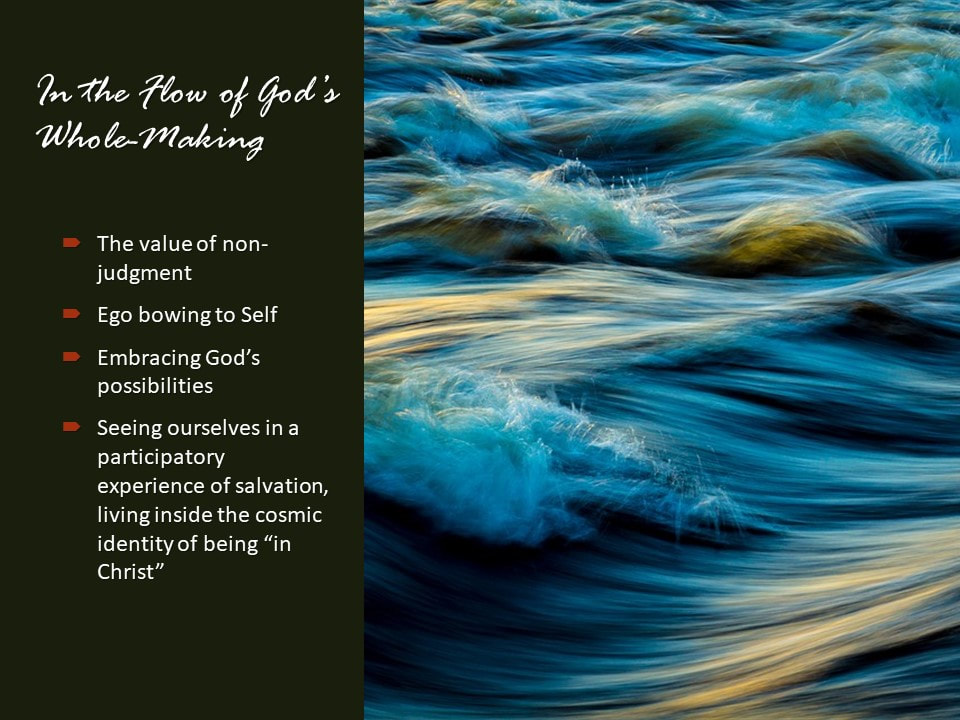Sheri D. Kling
Whitehead, Jung, and Psycho-Spiritual Wholeness

After having successfully defended my dissertation on Whitehead, Jung, and dream work as a spiritual practice for transformation at the Claremont School of Theology, I submitted two topics to the International Transpersonal Conference scheduled for September of 2017 in Prague. Its theme, “Beyond Materialism – Toward Wholeness,” fit well with my own research looking at the fragmentation in the U.S. caused I believe, at least in part, by the dualistic, mechanistic, and materialistic worldview within which we are living.
I believe strongly that the metaphysical cosmology of Alfred North Whitehead and the analytical psychology of Carl Gustav Jung are life-giving resources that can serve our psycho-spiritual wholeness well at this time in our history. This is even truer when combined with an authentic spiritual practice, such as dream work, that leads us to what I call embodied experiences of wholeness. The reason such embodied experiences are necessary is because simply assenting to any one of the many preferable worldviews available to us now, whether process philosophy/theology, panentheism, indigenous worldviews, ecofeminism, or similar relational cognitive frameworks is inadequate because we cannot think our way into a new way of being. We are facing a climate catastrophe that can end mammalian life as we know it on this planet. We are fragmented societally, interpersonally, and intrapersonally, and better ideas aren’t enough to get us to the transformation we need to live and relate to each other differently.
In Prague, I delivered a presentation entitled “’The Terrible Need for Metaphysics’: Answering Hillman’s Challenge through Whitehead along with a workshop discussing the relational-imaginal theory of dreaming I’ve developed.
Upon my return from Prague, Rosemarie Anderson, one of the founders of the field of transpersonal psychology and a fan of Whitehead invited me to submit an article for an upcoming issue of The Humanistic Psychologist focusing on transpersonal psychology. In that paper, “Whitehead’s Metaphysics as a Cosmological Framework for Transpersonal Psychology” (https://www.academia.edu/39396752/Whiteheads_Metaphysics_as_a_Cosmological_Framework_for_Transpersonal_Psychology), I make the case that Whitehead’s thinking can offer a solid framework for transpersonal psychology “because of his integration of subjective, objective, and transpersonal experience within one integrated cosmos, his argument that existence is made up of dynamic events that are both mental and physical, his unification of body and mind, his refusal to bifurcate subject and object within a relational reality, his validation of nonsensory perception as the basis for internal relations, and his description of a participatory cosmos of creativity and freedom where novelty, value, purpose, and transformation are universally available realities.”
But what does all of this mean for those of us who are just trying to increase the amount of wholeness and flourishing, or what Whitehead called “zest” or “intensity of experience,” in our own lives and in the lives of others?
For many years, archetypal psychologist James Hillman had a deep aversion to metaphysics because he was focused on the human psyche alone. But when he heard physicist David Bohm admit “frankly and sadly” that “physics had released the world into its perishing” through the nuclear bomb, Hillman suddenly “saw the terrible need for metaphysics.” In a chapter of the book Archetypal Process: Self and Divine in Whitehead, Jung, and Hillman, Hillman wrote,
The internal needs of the soul require that its psychology meet the soul's concerns about the nature of the cosmos in which it finds itself…Soul seeks to understand itself beyond itself; it attempts, in a strangely persistent and universal way, always to fantasy beyond; otherwise, would we have the many sciences and philosophies, the theories of origins and ends? This paranoid restlessness of the soul to be metaphysically satisfied by ultimates of meaning must be acknowledged as one of its internal needs.
It is an internal need of the psyche/soul to understand itself in relation to the cosmos in which we live. When we engage Whitehead at the level of cosmos, engage Jung at the level of psyche, and embrace spiritual practices that foster embodied experiences of wholeness, we learn in our own deep experience that we are part of a primordial, transpersonal Reality that shows us that we matter, that we belong, and that we can experience positive change.
Speaking at the recent Haden Institute Summer Dream & Spirituality Conference in Hendersonville, NC (https://www.hadeninstitute.com/summer-dream-conference), I wove together ideas from Whitehead, Jung, and also Fr. Richard Rohr (whose recent book The Universal Christ has been getting a lot of well-deserved traction) to talk about “The Whole-Making Nearness of God.” How can such ideas offer us hope in troubled times?
From a Whiteheadian perspective, we can understand God to be both near to us and actively involved in our wholeness because for each one of us, God is present to us, internal to us, in every moment of our existence, and offers us the creative possibilities that can move us out of our painful pasts into transformed futures. I believe that dream work is one practice we can use to discern those possibilities.
This is true no matter our place of birth, no matter our current or past circumstances, no matter if we believe a certain doctrine or not, no matter our gender, no matter the color of our skin or the content of our bank accounts. It is true for every one of us because this is how the world itself is continuously created. And the possibilities offered by God are always relevant for that moment. God offers us God’s self and God’s vision for our best outcome in every moment. God and God’s possibilities for our wholeness are as near to us as our next breath.
From a Jungian perspective, the “Unspeakable” primordial mystery at the base of all life is encounterable through the god-image in the psyche he called the Archetypal Self. And that Self works toward our wholeness as it draws us on a path of individuation in which we are given opportunities to integrate shadow material and novel possibilities by holding the tension between the opposing forces within us until our transcendent function kicks in, offering us something creatively transforming. This can often be experienced as a flow of grace.
We matter. We belong. And we can experience positive change because the Big Reality that we encounter at the base of our lives is seeking our wholeness and is encounterable within us. We can even learn to sing a song about that:
I believe strongly that the metaphysical cosmology of Alfred North Whitehead and the analytical psychology of Carl Gustav Jung are life-giving resources that can serve our psycho-spiritual wholeness well at this time in our history. This is even truer when combined with an authentic spiritual practice, such as dream work, that leads us to what I call embodied experiences of wholeness. The reason such embodied experiences are necessary is because simply assenting to any one of the many preferable worldviews available to us now, whether process philosophy/theology, panentheism, indigenous worldviews, ecofeminism, or similar relational cognitive frameworks is inadequate because we cannot think our way into a new way of being. We are facing a climate catastrophe that can end mammalian life as we know it on this planet. We are fragmented societally, interpersonally, and intrapersonally, and better ideas aren’t enough to get us to the transformation we need to live and relate to each other differently.
In Prague, I delivered a presentation entitled “’The Terrible Need for Metaphysics’: Answering Hillman’s Challenge through Whitehead along with a workshop discussing the relational-imaginal theory of dreaming I’ve developed.
Upon my return from Prague, Rosemarie Anderson, one of the founders of the field of transpersonal psychology and a fan of Whitehead invited me to submit an article for an upcoming issue of The Humanistic Psychologist focusing on transpersonal psychology. In that paper, “Whitehead’s Metaphysics as a Cosmological Framework for Transpersonal Psychology” (https://www.academia.edu/39396752/Whiteheads_Metaphysics_as_a_Cosmological_Framework_for_Transpersonal_Psychology), I make the case that Whitehead’s thinking can offer a solid framework for transpersonal psychology “because of his integration of subjective, objective, and transpersonal experience within one integrated cosmos, his argument that existence is made up of dynamic events that are both mental and physical, his unification of body and mind, his refusal to bifurcate subject and object within a relational reality, his validation of nonsensory perception as the basis for internal relations, and his description of a participatory cosmos of creativity and freedom where novelty, value, purpose, and transformation are universally available realities.”
But what does all of this mean for those of us who are just trying to increase the amount of wholeness and flourishing, or what Whitehead called “zest” or “intensity of experience,” in our own lives and in the lives of others?
For many years, archetypal psychologist James Hillman had a deep aversion to metaphysics because he was focused on the human psyche alone. But when he heard physicist David Bohm admit “frankly and sadly” that “physics had released the world into its perishing” through the nuclear bomb, Hillman suddenly “saw the terrible need for metaphysics.” In a chapter of the book Archetypal Process: Self and Divine in Whitehead, Jung, and Hillman, Hillman wrote,
The internal needs of the soul require that its psychology meet the soul's concerns about the nature of the cosmos in which it finds itself…Soul seeks to understand itself beyond itself; it attempts, in a strangely persistent and universal way, always to fantasy beyond; otherwise, would we have the many sciences and philosophies, the theories of origins and ends? This paranoid restlessness of the soul to be metaphysically satisfied by ultimates of meaning must be acknowledged as one of its internal needs.
It is an internal need of the psyche/soul to understand itself in relation to the cosmos in which we live. When we engage Whitehead at the level of cosmos, engage Jung at the level of psyche, and embrace spiritual practices that foster embodied experiences of wholeness, we learn in our own deep experience that we are part of a primordial, transpersonal Reality that shows us that we matter, that we belong, and that we can experience positive change.
Speaking at the recent Haden Institute Summer Dream & Spirituality Conference in Hendersonville, NC (https://www.hadeninstitute.com/summer-dream-conference), I wove together ideas from Whitehead, Jung, and also Fr. Richard Rohr (whose recent book The Universal Christ has been getting a lot of well-deserved traction) to talk about “The Whole-Making Nearness of God.” How can such ideas offer us hope in troubled times?
From a Whiteheadian perspective, we can understand God to be both near to us and actively involved in our wholeness because for each one of us, God is present to us, internal to us, in every moment of our existence, and offers us the creative possibilities that can move us out of our painful pasts into transformed futures. I believe that dream work is one practice we can use to discern those possibilities.
This is true no matter our place of birth, no matter our current or past circumstances, no matter if we believe a certain doctrine or not, no matter our gender, no matter the color of our skin or the content of our bank accounts. It is true for every one of us because this is how the world itself is continuously created. And the possibilities offered by God are always relevant for that moment. God offers us God’s self and God’s vision for our best outcome in every moment. God and God’s possibilities for our wholeness are as near to us as our next breath.
From a Jungian perspective, the “Unspeakable” primordial mystery at the base of all life is encounterable through the god-image in the psyche he called the Archetypal Self. And that Self works toward our wholeness as it draws us on a path of individuation in which we are given opportunities to integrate shadow material and novel possibilities by holding the tension between the opposing forces within us until our transcendent function kicks in, offering us something creatively transforming. This can often be experienced as a flow of grace.
We matter. We belong. And we can experience positive change because the Big Reality that we encounter at the base of our lives is seeking our wholeness and is encounterable within us. We can even learn to sing a song about that:
